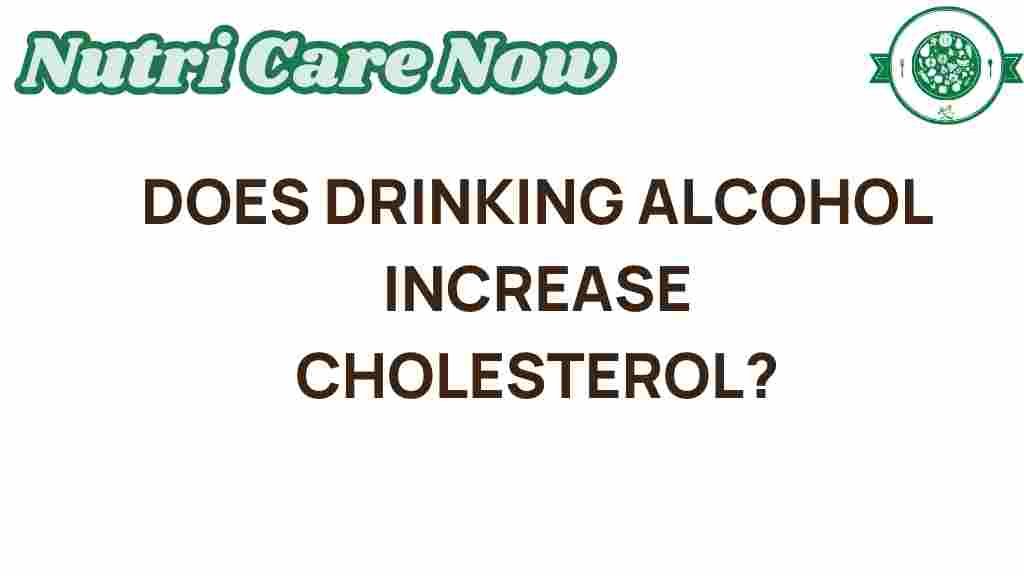Unveiling the Truth: Does Alcohol Consumption Elevate Cholesterol Levels?
Alcohol consumption has long been a topic of debate when it comes to health, particularly regarding its impact on cholesterol levels and heart disease. While moderate drinking is often touted for potential health benefits, the relationship between alcohol, cholesterol, and overall cardiovascular health is complex. In this article, we will explore whether alcohol truly elevates cholesterol levels, how it fits into a healthy lifestyle, and what research says about this connection.
The Relationship Between Alcohol and Cholesterol
To understand the potential effects of alcohol on cholesterol, it is essential to first grasp what cholesterol is and the types that exist:
- LDL (Low-Density Lipoprotein): Often referred to as “bad” cholesterol, high levels of LDL can lead to plaque buildup in arteries, increasing the risk of heart disease.
- HDL (High-Density Lipoprotein): Known as “good” cholesterol, HDL helps remove LDL from the bloodstream, thus protecting against heart disease.
Research indicates that moderate alcohol consumption may actually increase HDL levels, which could have a protective effect against heart disease. However, excessive alcohol intake can lead to increased triglycerides and higher LDL levels, negating any potential benefits.
Moderation is Key
When discussing alcohol and health, moderation is crucial. The definition of moderate drinking varies, but generally, it is considered:
- Up to one drink per day for women
- Up to two drinks per day for men
Exceeding these amounts can lead to numerous health issues, including elevated cholesterol levels, liver disease, and increased risk of heart disease.
Research Findings on Alcohol, Cholesterol, and Heart Disease
A variety of studies have examined the relationship between alcohol consumption and cholesterol levels:
- A study published in the American Journal of Cardiology found that moderate alcohol consumption was associated with higher HDL levels.
- Another research article in the Journal of the American Heart Association concluded that while moderate drinking could be beneficial, heavy drinking was unequivocally harmful, leading to increased LDL and triglyceride levels.
These findings suggest that while moderate alcohol consumption may offer some benefits, it is essential to be cautious of the amounts consumed and the individual’s overall health.
Risk Factors for Heart Disease and Cholesterol Levels
Many factors contribute to heart disease and elevated cholesterol levels. Understanding these risk factors can help individuals make informed decisions about alcohol consumption:
- Diet: A diet high in saturated fats and sugars can raise LDL cholesterol levels.
- Lifestyle: Lack of physical activity can contribute to obesity and poor cholesterol levels.
- Smoking: Tobacco use is a significant risk factor for heart disease, impacting HDL levels negatively.
- Genetics: Family history can play a crucial role in cholesterol levels and heart disease risk.
By addressing these factors, individuals can improve their heart health and manage cholesterol levels more effectively.
Step-by-Step Process: How to Integrate Alcohol Responsibly
If you choose to consume alcohol, here are steps to do so responsibly while maintaining heart health:
- Educate Yourself: Understand how different types of alcohol affect your body. For example, red wine is often highlighted for its potential heart health benefits due to antioxidants.
- Set Limits: Determine a sustainable limit for alcohol consumption based on personal health and guidelines for moderate drinking.
- Focus on a Balanced Diet: Ensure your diet is rich in fruits, vegetables, whole grains, and healthy fats to counterbalance any potential negative effects of alcohol.
- Incorporate Physical Activity: Regular exercise can improve cholesterol levels and heart health, offsetting some risks associated with alcohol.
- Regular Health Checkups: Monitor your cholesterol levels and overall health with your healthcare provider.
Troubleshooting Tips: What to Do if You Have Concerns
If you find yourself struggling with alcohol consumption or its impact on your health, consider the following tips:
- Consult a Healthcare Professional: Speak with your doctor about your alcohol consumption and cholesterol levels.
- Seek Support: Join support groups or programs designed to help individuals manage their alcohol intake.
- Keep a Journal: Track your alcohol consumption and how it affects your mood and health, helping you identify patterns.
- Find Alternatives: Consider non-alcoholic beverages that can satisfy social drinking without the risks associated with alcohol.
Conclusion: Making Informed Choices About Alcohol and Cholesterol
In conclusion, the relationship between alcohol consumption and cholesterol levels is nuanced. Moderate alcohol intake may offer some benefits in terms of raising HDL cholesterol, but it can also pose risks when consumed excessively. Understanding your personal risk factors for heart disease and managing your lifestyle and diet are paramount to maintaining a healthy heart.
Ultimately, the decision to include alcohol in your diet should be made carefully, considering both its potential benefits and drawbacks. Always consult with healthcare professionals and stay informed about the latest research regarding alcohol, cholesterol, and heart health.
For more information on heart disease and lifestyle choices, visit The American Heart Association.
This article is in the category Health and created by NutriCareNow Team
